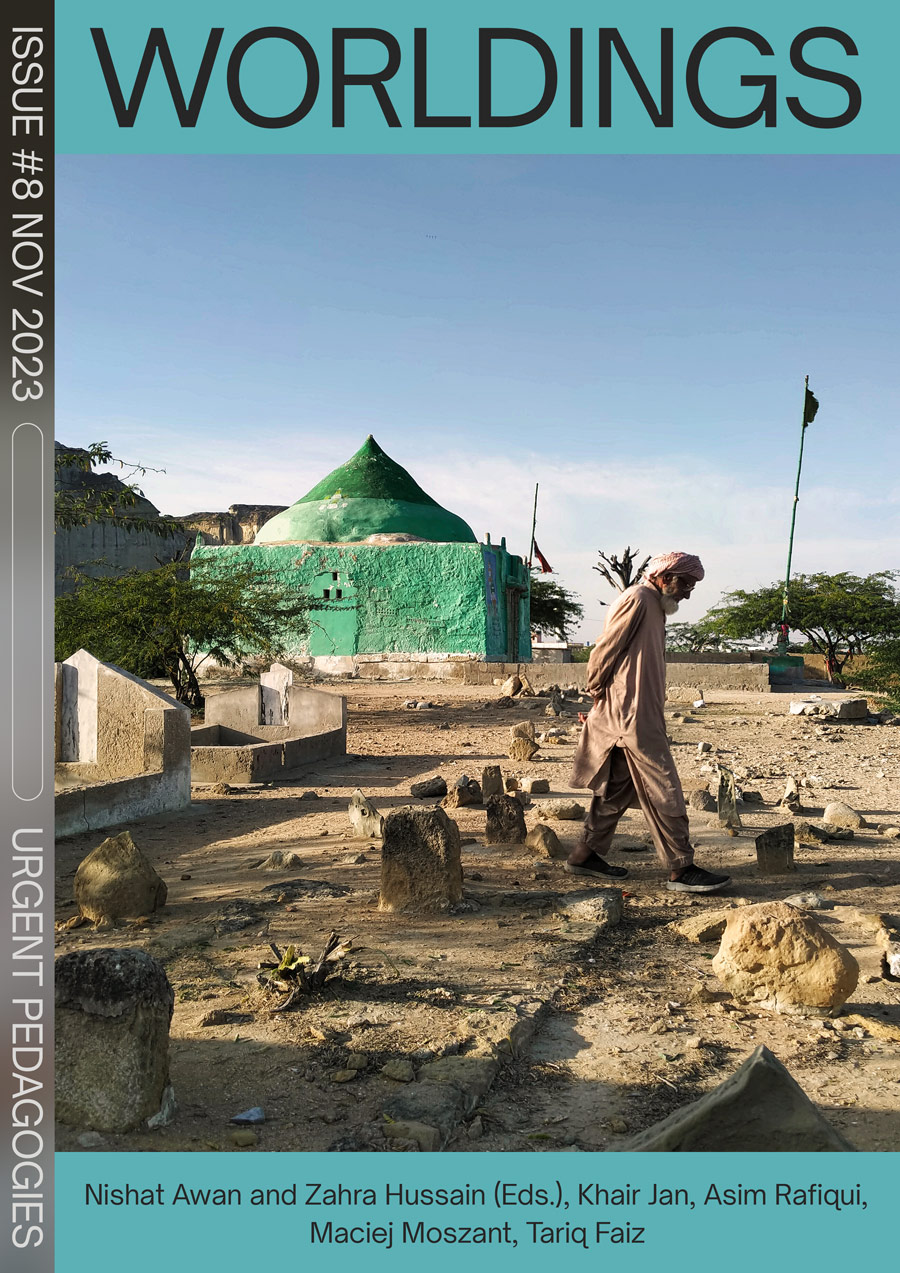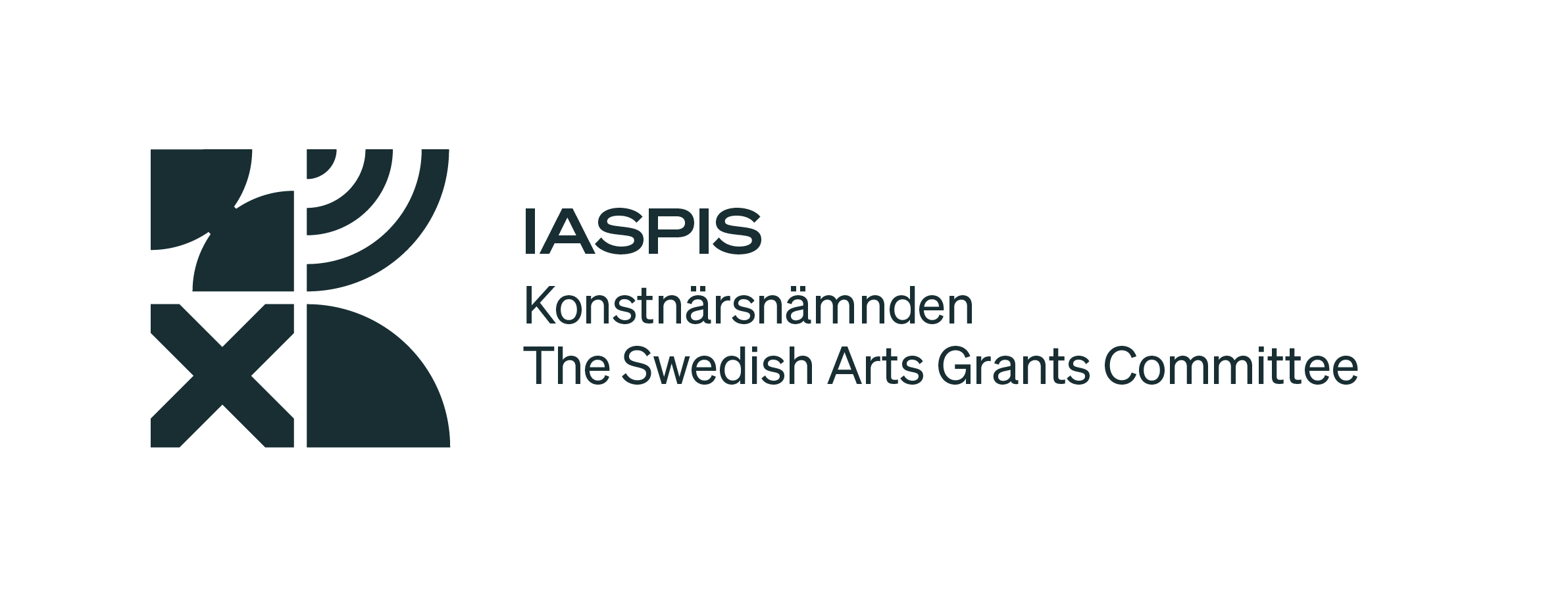My Dhooria | میرا ڈوریا
Khair Jan Khairul
CATEGORY
This is the story of my life. It is the story of the neighbourhood of Dhooria, where I was born and raised. My own story starts from this neighbourhood and is tied and woven with the stories, lives, and experiences of the people from here.
Those who gave Dhooria its name, those who laid the foundations of this neighbourhood, which is, in fact, the very foundation of the city of Gwadar, are no longer with us. Today, the elders in whose shadows I and others of my generation grew up are slowly disappearing. It will not be long before no one remembers them or their names. But these are my people. I don’t want to forget them. This work is my way of remembering them and writing a personal history of this town through their stories. There, conquerors and princes like Tipu Sultan, Shayr Shah Suri, and Mohammad Bin Qasim appear despite having little relevance or relation to our land, people, and memories.
Even Baloch national histories only tell us about chieftains like Chakkar Azam, Ghorram Lashari, and Hamal Jehind, who remain heroes for the people. These national histories comprise a few war poems and epics that remember and celebrate the kings and warriors who passed through these lands. But who will remember those like me? Who will remember this beautiful place called Dhooria, the waters that kissed its earth, and the mahigeer who once flourished here? Dhooria is the heart of Gwadar. Most don’t even care that this is known or its people remembered. But I do care, and this is my motivation: to get once again to know the people of Dhooria and, equally, for you to get to know them.
یہ میری کہانی ہے ، اور یہ داستان ہے ڈوریا کی۔ میری زندگی کی کہانی ڈوریا اور اسکے لوگوں کے قصوں سے وابستہ ہے کیونکہ میں بھی یہیں پیدا ہوا اور یہیں پلا بڑھا اور یہیں پر میری زندگی گزر رہی ہے۔ جن لوگوں نے ڈوریا کو ڈوریا کا نام دیا جو کہ گوادر شہر کی بنیا د بھی ہے ، ان میں آج کوئی بھی زندہ نہیں ہے۔ لیکن وہ بڑے اور بوڑھے جنہیں میں بچپن سے دیکھتا آ رہا ہوں اور وہ جو میرے ہم عصر ہیں وہ بھی آہستہ آہستہ معدوم ہوتے جا رہے ہیں۔کل انہیں نہ کوئی جانتا ہوگا نہ انکا کوئی نام لینے والا ہوگا۔ یہ سب میرے اپنے ہیں ۔ میں بس انہیں یاد کرنا چاہتا ہوں، ان سے وابستہ کئی کہانیاں اور داستانیں ریکارڈ پر لانا چاہتا ہوں۔ انہیں اپنے دور کی تاریخ میں درج کرنا چاہتا ہوں ۔ہمیں تاریخ پڑھائی گیی ٹیپو سلطان، شیر شاہ سوری اور محمد بن قاسم کی جو ہمارے علاقے کے لئے نا شناسا ہیں۔
ہماری قومی تاریخ میں چاکر اعظم ، گہرام لاشاری، حمل جیہند کو ہمارے ہیرو کے نام دئیے گيے جن کے قصے بلوچی تاریخ سے وابستہ کيے جاتے ہیں۔ لیکن ہماری قومی تاریخ کی بنیاد بس چند جنگی اشعار اور کچھ داستانوں پر مشتمل ہے۔ اشعار اور داستانیں تو ہمیشہ صرف وقت کے جنگجو سردار اور بادشاہوں کی تعریف میں کہی جاتیں تھیں تانکہ لوگ انہیں یاد رکھیں ۔ لیکن مجھے کون یاد رکھے گا؟ میرے اس ڈوریا اور اسکی خوبصورت ساحل اور یہاں کے ماہگیروں کو کون یاد رکھے گا ؟ کون جانتا ہے کہ گوادر کی بنیاد ڈوریا کی بستی ہے؟ اور شاید کوئی چاہتا بھی نہیں کہ اسے ڈوریا اور اسکے لوگوں کے بارے بتایا جائے۔ لیکن میرا عزم اور موقع یہی ہے میں ڈوریا کے لوگوں کو جانوں اور وہ مجھے جانیں، اور آپ ہمیں۔
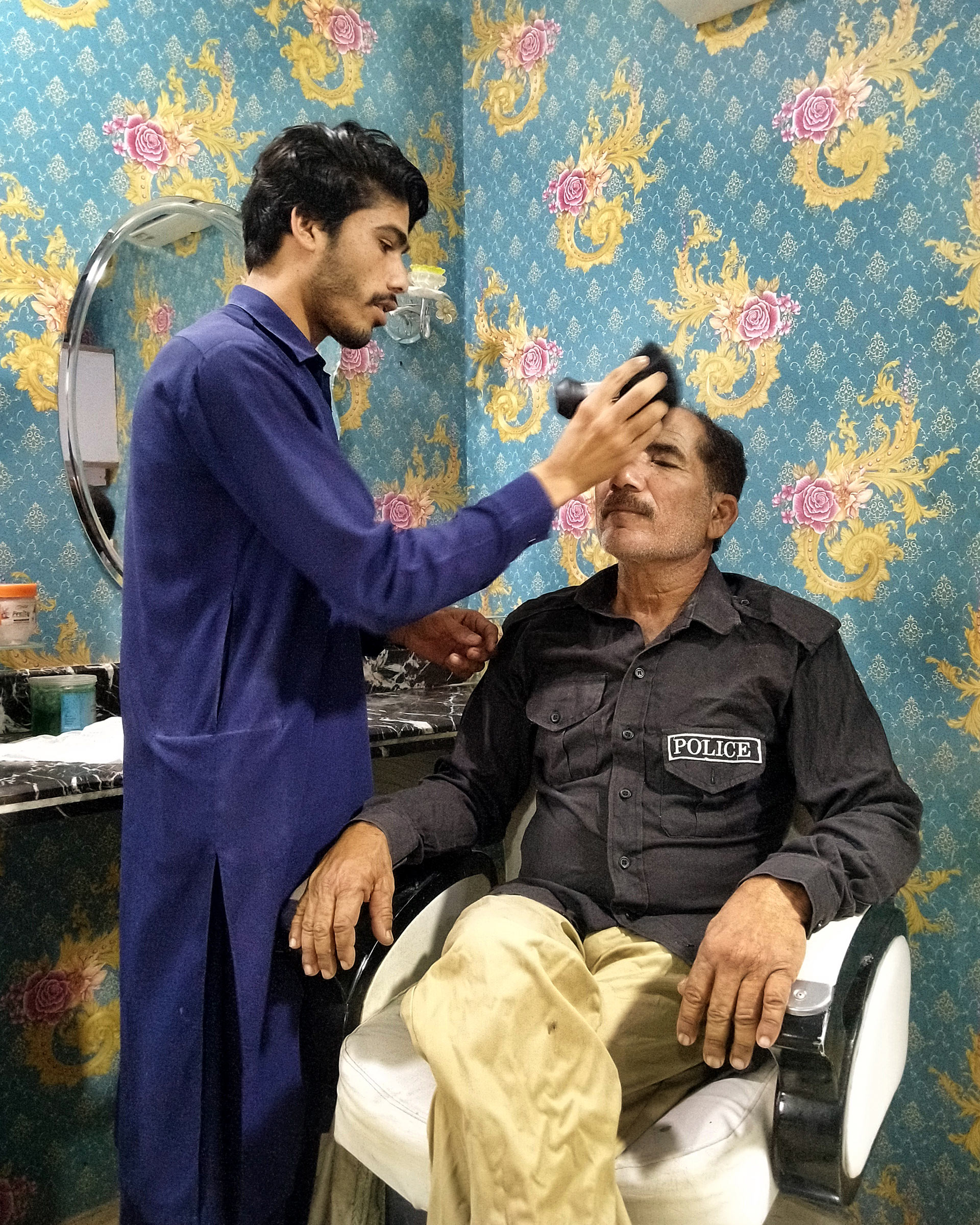
Photo: Khair Jan Khairul
My name is Abdul Ghani. I am the son of Mohammad Shanmbe. My friends and family call me Ghani Asif. I was born here in Dhooria, and this sea and this neighbourhood were the first things I saw when I first opened my eyes. This I remember, although I cannot remember when I uttered my first word or even when I first felt the waters and learned to swim. It was most likely when my father first took me to sea when I was still a child, and our boat suddenly capsized. He panicked and rushed towards me, only to see me swimming confidently. I am formally uneducated, but these waters, this shore, this neighbourhood of Dhooria, specifically the areas known as Sur Gaddal, have been my school and college. No one remembers the day, month, or year I was born, but my family remembers specific incidents and significant events around my birth. My mother told me that I was born when Gwadar was still a part of the Omani kingdom and that the town’s administrator–the Wali-e-Muscat–was someone called Wali Halal. She also tells me of a terrible incident that year when an armed soldier from the Walis killed some men with his gun and injured others with a sword and dagger. At that time, my older brother was two months old. My father tells me that my mother was pregnant with me when the first Eid Gah (Eid celebration stage or area) was inaugurated on Koh-e-Batil. He remembers this well because people contributed generously, as did we. It was also an excellent year of hunting, and men organised themselves into an addingo (collective hunt) to catch the highly sought and valued Kirr (Spotted Croaker). So you can estimate that I and the Eid Gah, constructed in 1962, are the same age.
میرا نام عبدالغنی ہے، میں محمد شنمبے کا بیٹا ہوں۔ مجھے غنی آصف کے نام سے پہچانا جاتا ہے۔ آنکھ کھلتے ہی میرے سامنے یہی “ڈوریا” ہے اور یہی سمندر۔ مجھے اسکا ہوش نہیں کہ کب میں نے بولنا شروع کیا اور بالکل اسی طرح یہ بھی یاد نہیں کہ کب میں نے تیرناسیکھا تھا۔ میں چھوٹا تھا جب میرے والد صاحب پہلی بار مجھے شکار کیلے سمندر میں لے گیے اور اچانک ہماری کشتی ڈوب گئی۔ والد گھبرا کر مجھے بچانے میرے پاس آنے لگے جبمجھے تیرتا دیکھا تو انہیں اطمینان ہوا ۔ میرا سکول اور درس گاہ یہی ساحل، سمندر، ڈوریا اور میرا محلہ “سورگدل” رہا ہے۔ میری پیدائش کا سال، مہینہ اور دن کسی نے نہیں لکھا بس اسی زمانے کے اہم واقعات اور حادثے کی تاریخ ہی میری اصل پیدائش کے دن اور سال کا پیمانہ ہے۔ جیسا کہ میری ماں بتاتی تھیں کہ اس زمانے میں جب گوادر عمان کا تھا اور گوادر انتظامیہ کا سربراہ”والیِ مسقط” والی حلال ہوا کرتا تھا تو ایک دن والی کے ایک سر پھرے سپاہی نے یہاں کے کئی مقامی لوگوں کو بندوق سے فائرنگ کر کے اورپھر تلوار اور خنجر کے وار سے قتل اور زخمی کیا تھا۔ اس وقت میرا بڑا بھائی مجید، دو مہینے کا تھا۔ میرے والد بتاتے تھے جب میں ماں کے پیٹ میں تھا تو یہاں کی پہلی عید گاہ کو بنانے کے لئے چندہ جمع کیا جا رہا تھا اور ہم نے بھی چندہ دیا تھا۔ اسی سال ہم نے مچھلیوں کا خوب شکار کیا تھا اور قیمتی مچھلی “کرٗ” (سࣳوا) کا آڈینگو )ایک ساتھ ڈھیر ساری مچھلیوں کا چند کشتیوں کے ساتھ اکٹھا شکار کرنا( کیا تھا۔ بس میں اور گوادر کی پہلی عید گاہ ہم عمر ہیں۔ یعنی میری تاریخِ پیدائش لگ بھگ 1962 کی ہو گی۔
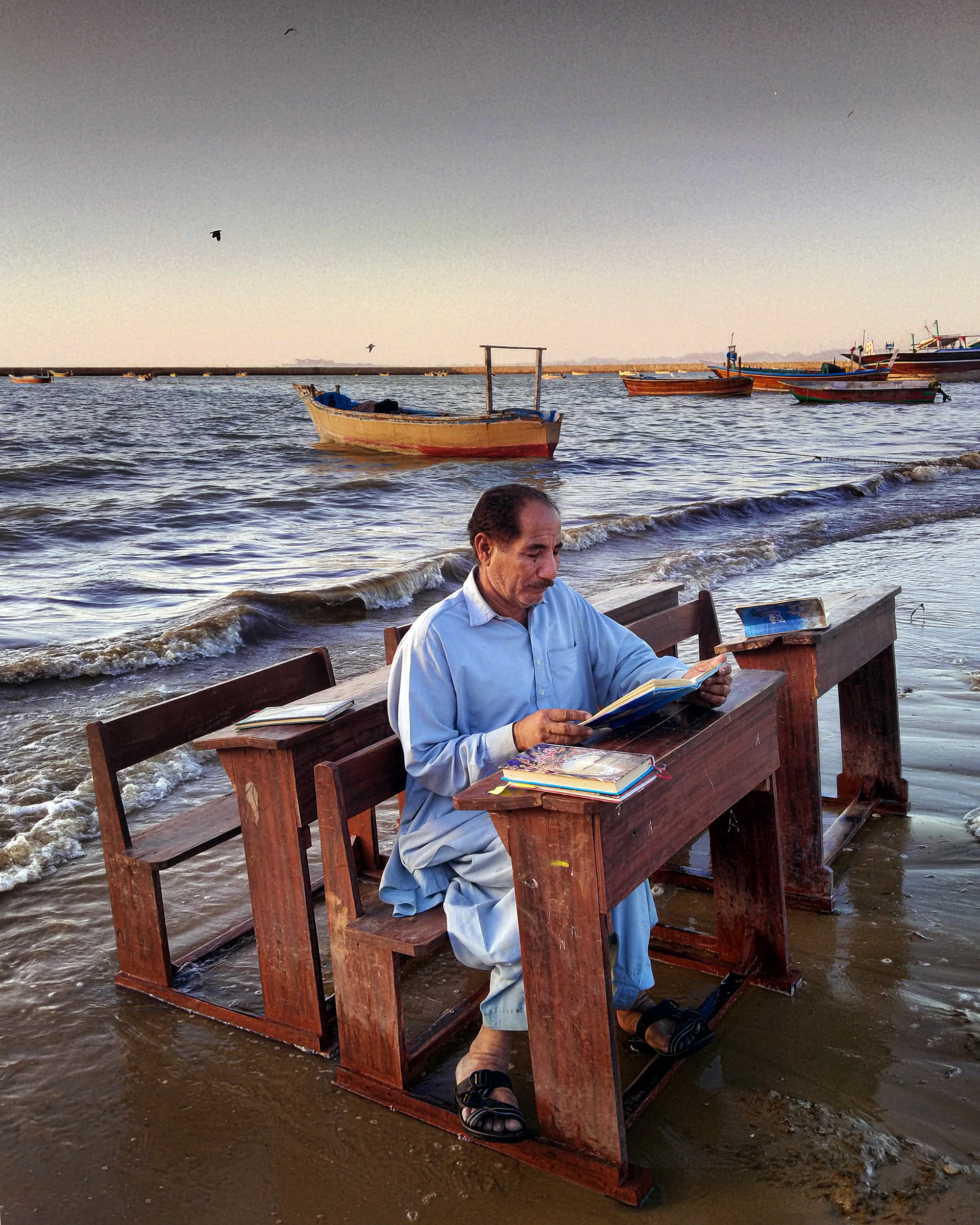
Photo: Khair Jan Khairul
I have never attended a school nor studied spiritual text at a madrassa. Yet, I can read and write in Urdu today and speak some English. I remember when I was still a child, there used to be a famous cinema hall–the Taj Mahal Cinema–in our neighbourhood of Sur Gaddal. People used to gather at the Marook Hotel in the city’s Shahi Bazaar to see the posters that told them what films were being shown that week. I struggled to read these posters and had to ask people to tell me what was on. This bothered me, and I asked myself why I could not. Then, I and some of my friends started to teach ourselves how to read and write in Urdu. Although Abdul Rehman Abid, Akbar Hashim, and Elahi Buksh were my principal teachers, I learned something about reading and writing from almost all my friends. Whether on the shore, at sea, in the bazaar, or at a cafe, I always had a book with me and was always practising. Some, like Ahmad Nadeem, Rafiq Juma, and Sikandar Majeed, when they saw that despite my age, I was determined to learn to read and write, encouraged me to sit for the fifth-year high school exams, saying that I would get admission into a high school. But of course, my circumstances and age required that I prioritise my work as a mahigeer to provide for myself and my family. But I did make sure that those who came after me were not denied this opportunity and that every single young sibling and each one of my children attended high school. Today, my daughter is a university graduate and a college lecturer.
میں نہ کبھی اسکول گیا نہ کبھی کسی مدرسے سے نورانی قاعدہ پڑھا۔لیکن آج میں اردو میں لکھ پڑھ سکتا ہوں۔ تھوڑی بہت انگلش سے بھی کام چلا سکتا ہوں ۔ جب میری نوعمری میں، ہمارے محلہ کے قریب سورگدل میں تاج محل سنیما بنا تو اس کے فلمی پوسٹر شاہی بازار میں مروک ہوٹل کے سامنے لگتے تھے جس کے نام پڑھے لوگ جانتے تھے کہ یہ پوسٹر کس فلم کا ہے لیکن میں ہمیشہ ان سے پوچھتا رہتا تھا کہ یہ کونسی فلم لگی ہے۔ پھر میں دل میں سوچنے لگا کہ میں کیوں نہیں پڑھ سکتا؟ تب میں نے اپنے دوستوں کے ساتھ اردو لکھنا پڑھنا شروع کیا۔ میرے استاد عبدالرحمن عابد، اکبر ہاشم، اور الہی بخش رہے تھے۔ لیکن میں نے اپنے سارے دوستوں سے لکھنا پڑھنا سیکھا۔ سمندر، بازار، ہوٹل، ہر جگہ کتاب میرے ساتھ رہتی۔ احمد ندیم، رفیق جمعہ، اور سکندر مجید نے جب میری بڑی عمر میں ہو کر لکھنے پڑھنے کے شوق کو دیکھتے تھے تو انہوں نے میری بڑی حوصلہ افزائی کی اور کہا تم پانچ جماعت کا امتحان دے دو ۔ششم میں داخلہ ملے گا۔ چونکہ میں بڑا تھا، اپنی غریبی کے سبب اسکول جانے کی بجائے روز گار کے لیے ماہیگیری کو ترجیح دی ۔لیکن میں نے اپنے سے کم عمر عزیزوں کے لئے علم کا دروازہ کھول دیا اپنے سارے بھائیوں اور بچوں کو اسکول میں پڑھوایا۔ اور اپنی بیٹی کو کالج یونیورسٹی تک پہنچا دیا۔ آج میری بیٹی کالج میں لکچرار ہے۔
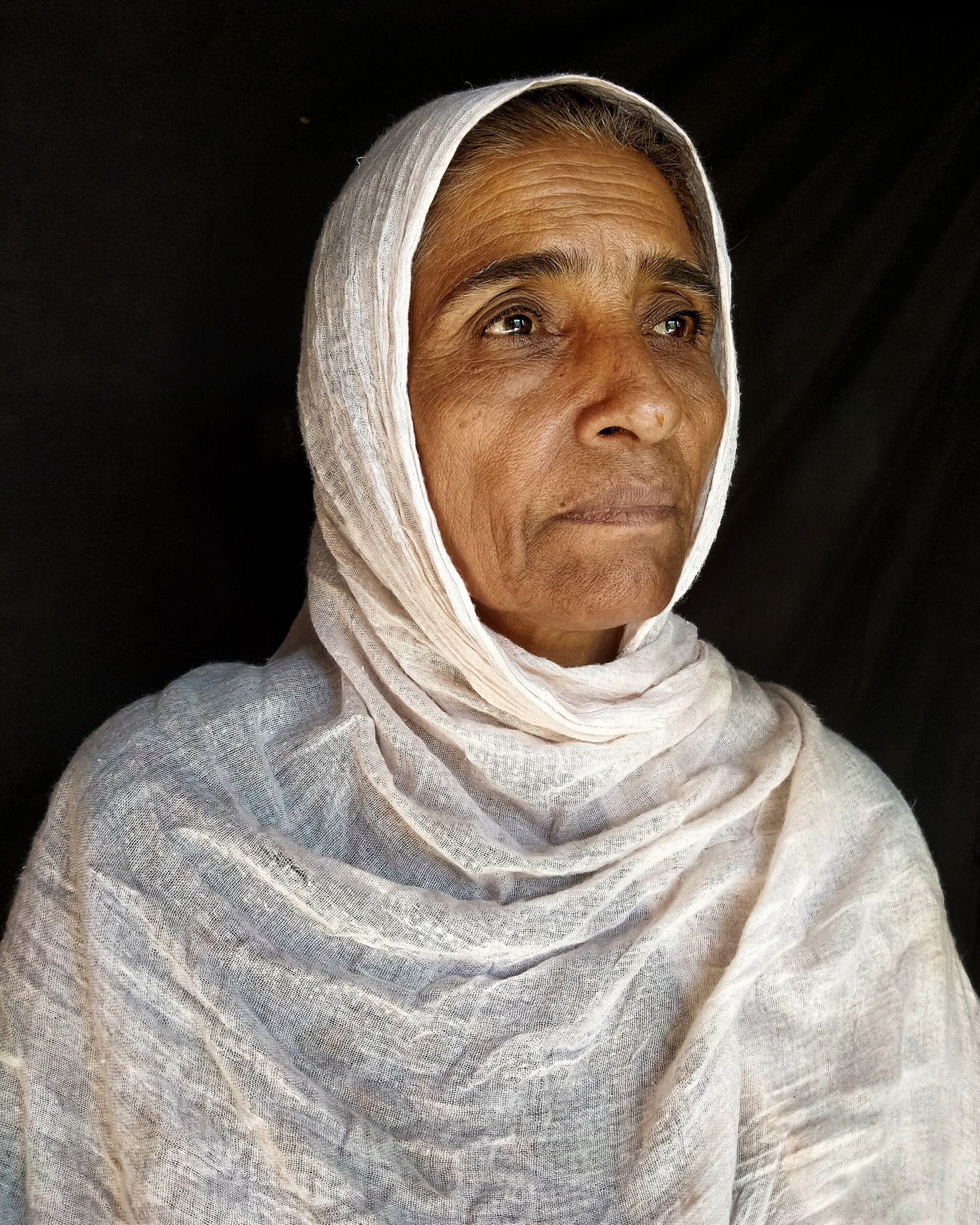
Photo: Khair Jan Khairul
My name is Mumtaz, and I am the daughter of Daad Rehman. Ghani Asif and I were married in 1983, and the earlier years of my marital life were focused on running our home and raising our children. In the 1990s, several NGOs (Non-Governmental Organizations) began to arrive in the city as new development projects were underway. I worked with the National Rural Support Program (NSRP) and attended several workshops they held in the town and have also served as vice chair for their self-help programmes. Subsequently, I ran for municipal elections in 2005 and was elected as a counsellor of the local women’s support organisation in Gwadar. My husband, Asif Ghani, who also ran for a post in the same election, was also selected for a counsellor’s office. The two of us have worked hard to help address the problems and concerns of the people of our community, although it is evident that people remain disappointed with what we have achieved.
میرا نام ممتاز ہے۔میں داد رحمان کی بیٹی ہوں۔ میں نے 1983 میں غنی آصف سے شادی کی۔ شادی کے بعد کئی سال گھر اور بچوں کو سنبھالنے میں گزر گئے۔ جب گوادر میں این جی اوز کا زمانۂ آیا یہیں کوئی 1990 ہوگا تومیں نے بھی انکے ساتھ کافی کام کئے۔RCDC گوادر اور دیگرNGOsکے کافی پروگرام اور ورکشاپ میں شرکت کی۔ میں NRSP کے پروگرام”اپنی مدد آپ” کے قائم کردہ تنظیم کی نائب صدر بھی رہی ہوں۔ پھر میں نے 2005 کے بلدیاتی الیکشن میں حصہ لیا ۔تحصیل کونسل گوادر کی ممبر)خواتین کونسل (کی نشست حاصل کی ۔ اسی الیکشن میں غنی آصف بھی بطور کونسلر منتخب ہوئے تھے۔ ہم دونوں کی ہمیشہ یہ کوشش رہی تھی کہ ہم اپنے محلہ ،علاقے اور لوگوں کے مسائل اچھے طریقے سے حل کریں۔ لیکن ہمیں احساس ہوا کہ لوگ کبھی بھی کونسلروں یا بلدیاتی نمائندوں سے خوش نہیں ہوتے ہیں۔
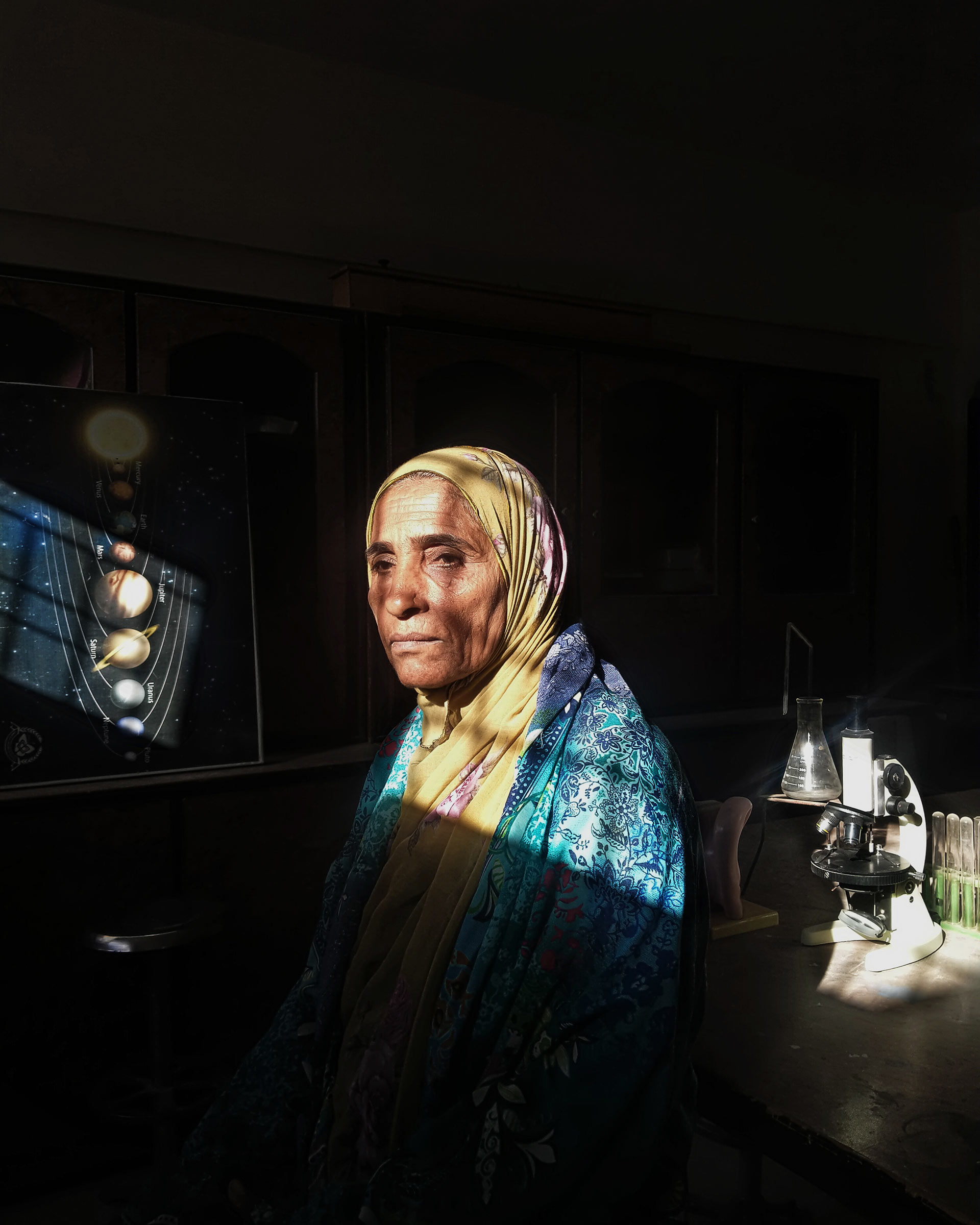
Photo: Khair Jan Khairul
My daughter Ayesha studied at the Agha Khan School in Gwadar. Around the 8th grade, she first expressed an interest in studying science after graduating. When I tried to admit her to the Mullah-Bundh Girl’s High School, I realised they had no science classes or laboratory facilities. So I wanted to admit her to one of the city’s more prominent, elite high schools, but they refused to meet with me and Ayesha because we were from a different part of the city. Then, I decided that my daughter and niece would attend the local boy’s school to get the necessary science education. I approached Ghaffar Hoot, who was the District Nazim at that time. When he heard my concern, he called the District Education Officer, Khan Mohammad, into his office to discuss the matter. Khan Mohammad told me that I should take my daughter the following day to the Mullah-Bandh Girls’ School and have her admitted and that the issue would be resolved. I remember going to the school the next day and the surprised look on the Principal’s face when I informed her that I was admitting my daughter to the science section. She was confused, and a few moments later, Khan Mohammad himself walked through the door and politely informed Miss Noori, the Principal, that as of today, there would be a new science section for girls and that he would make arrangements for the set-up of a science laboratory at the school, and the arrival of a science teacher.
یری بیٹی عائشہ آغا خان اسکول گوادر میں پڑھتی تھی۔ ہشتم کے بعد اس نے مجھے کہا کہ وہ سائنس پڑھے گی۔ میں نے اسے اپنے محلہ کے ملابند گرلز ہائی اسکول میں داخلہ کرانا چاہا لیکن وہاں سائنس کی کلاسیں نہ ہونے کی وجہ سے داخلہ نہ ہو سکا۔ تب میں اسے گوادر کے بڑے گرلز اسکول میں لے گئی ، لیکن اسکول کی ہیڈ مسٹر یس نے ہم سے بات تک نہیں کی کیونکہ وہ اسکول ہمارے محلہ کا نہیں تھا ۔تب میں نے فیصلہ کیا سائنس کی تعلیم کے حصول کے لئے عائشہ اور رخسار (میری بھانجی) لڑکوں کے اسکول میں پڑھیں گی۔ یہ مسئلہ میں نے محترم غفار ہوت صاحب کے سامنے رکھا جو اس زمانے میں ہمارے ضلعی نائب ناظم تھے۔ انھوں نے ڈسٹرکٹ ایجوکیشن آفیسر خان محمد کو اپنے آفس بلایا اور اس مسئلے پر بات جیت کی۔ خان محمد صاحب نے مجھے کہا کہ کل جا کر ملا بند گرلز اسکول گوادر میں اپنی بچی کو داخل کرائیں ۔دوسرے دن میں اسکول میں گیی تو وہاں کی میڈم مس نوری حیران ہوئی کہ اسے کیسے داخلہ دوں، یہاں تو نہ سائنس پڑھانے والی استانیاں ہیں نہ سائنس لیبارٹری ۔ کچھ دیر کے بعد خان محمد صاحب خود آ کر میڈم نوری کو بتاتا ہے کہ آج سے یہاں سائنس پڑھنے کی خواہش رکھنے والی طالبہ کو داخلہ دیں اور اسکے لیے اسکول کو جلد سائنس ٹیچر بھی ملے گا اور لیبارٹری بھی۔
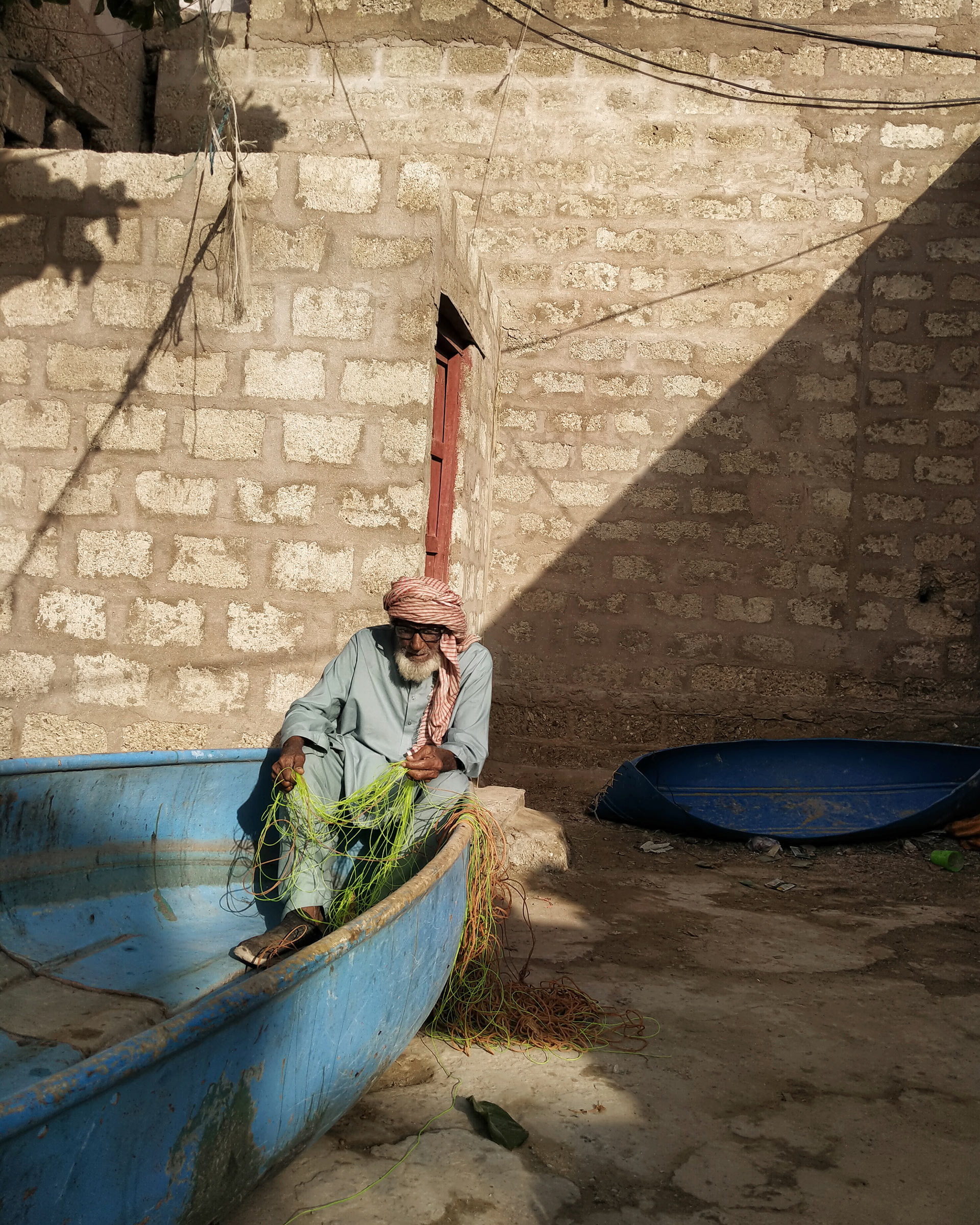
Photo: Khair Jan Khairul
My name is Ismael. My friends and family call me Ismael Bhaiya (Brother Ismael). Small children from the neighbourhood call me Wajo Bhai, Grandad, or Nakhuda (Captain) Ismael Bhai. I think I must now be about 95 years of age, maybe more but not less. Most everyone I grew up with or was friends with is now long gone and buried. I was a mahigeer in the age of boats that relied on cloth sails and wooden rudders. That was a different age, and I remember Dhooria as a place of great joy. We would work on our wooden boats on the shore, cleaning and scraping their hulls with oils derived from various fish. The beach was where we worked on our nets, repairing and improving them. Our boats lined the entire stretch of the Demi Zirr shore, from the fish auction sheds at Purdo to the marketplace. Dhooria was practically a bazaar. There were many hotels selling chai and food, men and women selling rice, and local Baloch farmers came here to sell their watermelons, melons, shilanj, berries, milk, lassi, herbs, and other edibles. The shore and the sea are my earliest memories. This sea is our life, but it is also our death. We, the mahigeer, are like a fish out of water, unable to survive a moment away from it. My father died when I was very young after being bitten by a sea snake. Hundreds have disappeared into its depths, and I, too, have had my boat capsized and looked death in the eye if not for the grace of Allah. My son, Usman, the khalasi (deck boy) on my boat, who now has mental health issues, saved my life on at least three occasions. I could tell you a thousand tales about this sea and my life with it.
یرا نام اسماعیل ہے۔ میرے جاننے والے مجھے اسماعیل بھیا پکارتے ہیں ۔ چھوٹے بچے اور لڑکے مجھے واجو بھیا، دادا بھیا، یا ناخدا اسماعیل بھیا پکارتے ہیں ۔ میرے خیال میں میری عمر 95 سال سے زائد ہو گی کم نہیں ۔میرے زمانے کے ڈوریا کے سارے لوگوں کی اب وفات ہو چکی ہے ۔ میرا زمانہ بادبان اور پتوار کا تھا۔ انجنیں بعد میں آگئی ہیں۔ ہمارے زمانے میں ڈوریا میں بہت خوشیاں تھیں۔ یہاں ہم اپنی لکڑی سے بنی کشتیوں کی کائیوں کو کھرو جتے اور انہیں نرم کرنے مچھلی کے پگلائیے جگر استعمال کرتے ۔یہاں ہم اپنے شکار کے جال بنتے۔ پُردو (بڑی لانچوں کے مچھلیوں کی نیلامی کی جگہ) سے لے کر مچھلی مارکیٹ تک ساحل پر کشتیاں ہی کشتیاں ہوتی تھیں ۔ڈوریا ایک بازار کی طرح ہوتا تھا۔ یہاں، چائے اور کھانے کے ہوٹل، اور چاول بیچنے والے ہوتے تھے۔ ارد گرد کے دیہاتی بلوچ تربوز، خربوزہ، بیر، دودھ ،لسی، شیلانج، کھانے کے لائق مختلف جڑی بوٹیاں لا کر یہاں بیچتے ۔جب سے میں نے ہوش سنبھالا یہی سمندر اور ساحل تھا۔ سمندر کا روزگار یا ماہیگیری کا دوسرا نام موت ہے بھیا۔ لیکن یہی سمندر ہماری زندگی اور روزگار بھی ہے۔ جس طرح مچھلی بغیر پانی کے نہیں رہ سکتی، اسی طرح ماہیگیر بھی بغیر سمندر کے نہیں رہ سکتا۔ میں چھوٹا تھا جب میرے باپ کی سمندری سانپ کے کاٹنے سے وفات ہو گئی ۔ اس سمندر میں نہ جانے کتنے لوگ ڈوب چکے یا لاپتہ ہو گئے ہیں ۔ کئی بار میں بھی ڈوبا تھا۔ زندگی کی امید تک نہیں تھی لیکن ﷲ مہربان نے اب تک زندہ رکھا ہے۔ میرا بیٹا عثمان جسکا آج کل زہنی توازن بگھڑچکا ہے ،یہ میرا خلاصی ہوتا تھا۔ تو ﷲ کے بعد اسی نے تین چار بار مجھے ڈوبنے سے بچایا تھا۔ میرے اور میرے اس سمندر کے قصے کہانیاں اتنی زیادہ ہیں جتنی میری عمر ہے۔
Once, when I was in Karachi, I joined the crew of a large fishing launch. I was quite young then, and the captain only agreed to take me on for half-pay. I agreed to the terms. We were fishing near Astola Island (known as Jezira Haft Talar in Balochi and also called by some as “Island of the Seven Hills”), and soon after laying our nets in the waters, we caught some excellent and valuable fish. The catch was so huge that the entire net turned white. I remember an intensely cold breeze blowing (Zirdguad) across the waters, making pulling out nets with our catch nearly impossible. With the net floating on top of the waters and us unable to retrieve it quickly enough, many fish escaped to sea.
ایک بار جب میں کراچی میں تھا تو میں ایک مچھلی شکار کرنے والی لانچ (بڑی کشتی ) کی ٹیم میں شامل تھا۔ میں جوان تھا لیکن ناخدا نے کہا میں تمہیں آدھا پیسہ دونگا ۔میں نے کہا مجھے قبول ہے۔ پھر جزیرہ ہفتلار (استولا) میں ہم نے اپنے جال شکار کے لئے سمندر میں ڈالے تو صبح ہمارے جال میں قیمتی مچھلیاں بڑی تعدد میں آ گئیں بھیا! اتنی زیاده کہ سارا جال جیسے سفید رنگ کا نظر آ رہا تھا ۔ انتہائی ٹھنڈی ہوا (سیارو۔گرو) چل رہی تھی جس سے موسم بہت سرد ہو چکا تھا۔ ہم مچھلیاں نکالنے لگے لیکن ہوا کے زور سے جال ہمارے قابو میں نہ رہا۔ جو مچھلیاں جالمیں تھوڑی کم پھنسی ہوئیں تھیں وہ لانچ کے ہچکولوں سے جال نکل کر سمندر میں بہے جا رہیں تھیں۔
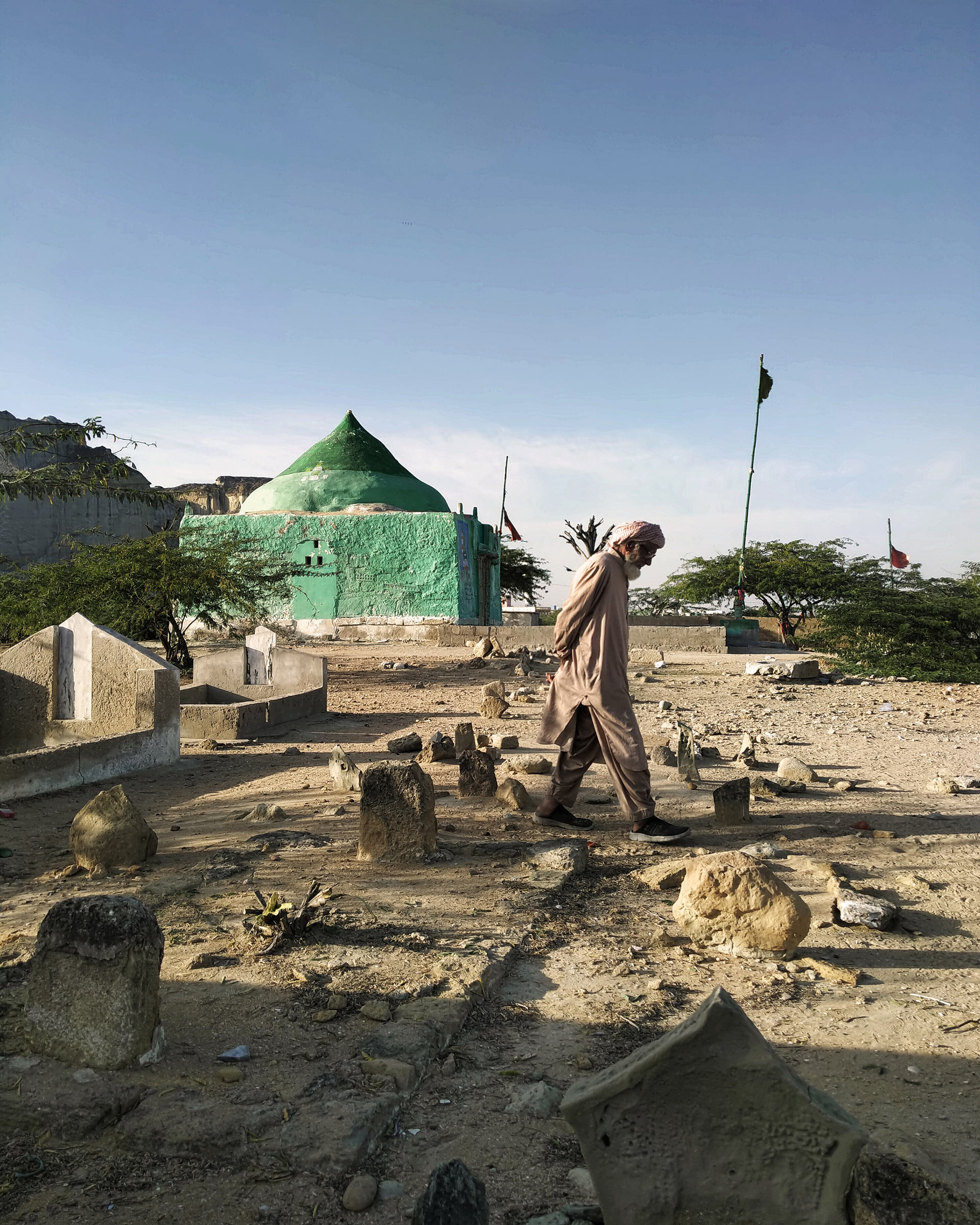
Photo: Khair Jan Khairul
The nakhuda (boat captain) was furious and shouted at us to stop the fish from escaping. And by the way, the fish was valuable, it was Sooah (Spotted Croaker). I remember tearing off my clothes, grabbing a rope and kulaab (metal hook for catching fish), and diving into the cold waters. I started to hook fish that seemed loose from the net and passed these along to the other khalasi sitting in the boat. I was fighting and catching the fish in those cold waters for hours. The nakhuda was so impressed that he gave me my full pay at the end of the trip. I love this sea. Without it, I cannot imagine being happy or feeling fulfilled. I didn’t care about rain or storms, they could not stop me from going to sea. Whenever I needed money, the sea gave it to me. My son’s health and illness later compelled me to go to sea alone. I was still working the waters in my small boat until a few years ago. Now, however, I no longer have the strength. Now, finally, the ocean is beyond my reach.
ناخدا چیخنے لگا، “ارے لڑکو! مچھلیوں کو پکڑو پانی میں جانے نہ دو”۔ اور پھر بھیا مچھلیاں بھی سسواوا (کر) تھیں ، جو کہ زیادہ قیمتی ہیں۔ تب میں نے اپنا لباس اتارا۔ چڈی پہنی اور موٹی رسی اپنی کمر پر باندھ لی اور کلاب) وزنی مچھلیوں پکڑنے والا ہک ( میں نے ہاتھ میں لیا اور سمندر میں چھلانگ لگا دی ۔جو مچھلی چھڑنے لگی تھی اسے کلاب لگاتا تھا اور دوسرے خلاصی جو لانچ میں جال کھینچ رہے تھے تو وہ اس مچھلی کو جسے میں کلاب لگایا بھی کھینچتے تھے۔ بھیا ! میں شام تک ٹھنڈے پانی اور ٹھنڈی ہوا کا سامنا کرتے ہوئیے، مسلسل تیرتے ہوئیے مچھلیاں پکڑتا رہا۔ یہ سب دیکھ کر ناخدا مجھ سے بہت خوش ہوا اور پھر مجھے پورے کے پورے پیسے دئیے ۔ میں سمندر کا عاشق تھا۔ میں سمندر کے بغیر اپنے کو خوش نہیں پاتا تھا۔ میں بارش اور نیم طوفانی ہواؤں کی پرواہ نہیں کرتا تھا، یہ مجھے جانے سے روک نہیں سکتی تھیں ۔ مجھے جب بھی پیسوں کی ضرورت پڑتی سمندر سے ہی مجھے ملتا تھا، جب میرا بیٹا عثمان پاگل ہو گیا تو میں اکیلا روزگار کے لئے سمندر جاتا ۔ چند سال پہلے تک میں اپنی چھوٹی کشتی (کٹی) لے کر شکار کے لئے جاتا تھا لیکن اب مجھ میں سمندر جانے کی ہمت نہیں ۔ اب میں بوڑھا ہو چکا ہوں، جا نہیں سکتا ۔
This text has been commissioned and written uniquely for Urgent Pedagogies.
is an actor, producer, photographer, and a mahigeer (fisher) who was born and raised in Dhooria, Gwadar and comes from a long line of mahigeer who have claimed Gwadar as their home for at least six generations.
